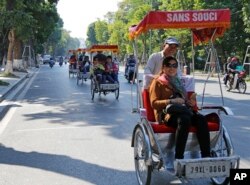A series of incidents involving Chinese tourists in Vietnam has fueled tension despite the countries’ efforts to improve relations.
Last week, 14 Chinese tourists passed through immigration in the central Vietnamese province of Khanh Hoa, all wearing the same red-on-white T-shirts.
The shirts showed a nine-dash line marking China’s claim to the entire South China Sea. The marking covers area that Vietnam also claims as its own.
Vietnam’s immigration officials seized the shirts. And Vietnamese voiced their anger online toward the Chinese tourists.
The incident is at least the fourth involving Chinese tourists over the past two years.
Trung Nguyen is head of international relations at Ho Chi Minh University of Social Sciences and Humanities. He said, "We can see that the Chinese government might increasingly use civilians as a way to spread their sovereignty claims in the South China Sea, from militia fishermen to uber-nationalist southbound tourists.”
A series of incidents
China and Vietnam have had a long history of dispute. In the 1970s, the two neighboring countries fought a border war that resulted in many deaths on both sides.
Now, the two are involved in a dispute over parts of the South China Sea rich in fisheries, oil and gas. China commands the more powerful armed forces and has militarized small islands in the disputed parts of the sea.
VnExpress International is a news website with official permission to operate in Vietnam. It said that in 2016, the city of Da Nang suspended a travel agency because it offered travel services to Chinese visitors who burned Vietnamese money.
That same year, China asked Vietnam to investigate whether immigration officials had written profanity into the passport of a Chinese visitor to Ho Chi Minh City.
VN Express also said Chinese tour guides have sometimes spread anti-Vietnamese information about history to tour groups.
Oh Ei Sun teaches international studies teacher at Singapore Nanyang University. He said people in both countries are influenced by the nationalist traditions in their education.
"Of course they would think that those disputed territories unquestionably belong to them and therefore all others are sort of occupiers and should be gotten rid of as soon as possible," Sun said.
Still trying to get along
Officials from the two countries, however, are trying to get along.
China and Vietnam have held defense talks and exchanged state visits. The two ruling Communist parties have also met regularly since 2014. And the two countries depend on each other for economic activities.
Adam McCarty is the chief economist with Mekong Economics in Hanoi. He said China sees Vietnam as an economic link to Southeast Asia. Vietnam looks to China as a top trading partner and Chinese tourism to support its service economy.
He said, "There will still be some on both sides who are overtly nationalistic and trying to push issues with these silly T-shirts. I think the Vietnamese government (is) not going to be provoked by that.”
I’m Phil Dierking.
Ralph Jennings reported this story for VOANews. Phil Dierking adapted the story for Learning English. Hai Do was the editor.
Have you seen tourist try and make political statements while traveling? Write to us in the Comments Section or on our Facebook page.
______________________________________________________________
Words in This Story
profanity - n.offensive language
province - n. any one of the large parts that some countries are divided into
provoke - v. to cause the occurrence of (a feeling or action)
sovereignty - n. a country's independent authority and the right to govern itself
uber - adj. used to indicate that someone is a great or extreme example of a particular kind of person






